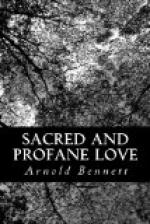PART I
IN THE NIGHT
I
For years I had been preoccupied with thoughts of love—and by love I mean a noble and sensuous passion, absorbing the energies of the soul, fulfilling destiny, and reducing all that has gone before it to the level of a mere prelude. And that afternoon in autumn, the eve of my twenty-first birthday, I was more deeply than ever immersed in amorous dreams.
I, in my modern costume, sat down between two pairs of candles to the piano in the decaying drawing-room, which like a spinster strove to conceal its age. A generous fire flamed in the wide grate behind me: warmth has always been to me the first necessary of life. I turned round on the revolving stool and faced the fire, and felt it on my cheeks, and I asked myself: ‘Why am I affected like this? Why am I what I am?’ For even before beginning to play the Fantasia of Chopin, I was moved, and the tears had come into my eyes, and the shudder to my spine. I gazed at the room inquiringly, and of course I found no answer. It was one of those rooms whose spacious and consistent ugliness grows old into a sort of beauty, formidable and repellent, but impressive; an early Victorian room, large and stately and symmetrical, full—but not too full—of twisted and tortured mahogany, green rep, lustres, valances, fringes, gilt tassels. The green and gold drapery of the two high windows, and here and there a fine curve in a piece of furniture, recalled the Empire period and the deserted Napoleonic palaces of France. The expanse of yellow and green carpet had been married to the floor by two generations of decorous feet, and the meaning of its tints was long since explained away. Never have I seen a carpet with less individuality of its own than that carpet; it was so sweetly faded, amiable, and flat, that its sole mission in the world seemed to be to make things smooth for the chairs. The wall-paper looked like pale green silk, and the candles were reflected in it as they were reflected in the crystals of the chandelier. The grand piano, a Collard and Collard, made a vast mass of walnut in the chamber, incongruous, perhaps, but still there was something in its mild and indecisive tone that responded to the furniture. It, too, spoke of Evangelicalism, the Christian Year, and a dignified reserved confidence in Christ’s blood. It, too, defied the assault of time and the invasion of ideas. It, too, protested against Chopin and romance, and demanded Thalberg’s variations on ‘Home, Sweet Home.’
My great-grandfather, the famous potter—second in renown only to Wedgwood—had built that Georgian house, and my grandfather had furnished it; and my parents, long since dead, had placidly accepted it and the ideal that it stood for; and it had devolved upon my Aunt Constance, and ultimately it would devolve on me, the scarlet woman in a dress of virginal white, the inexplicable offspring of two changeless and blameless families, the secret revolutionary, the living lie! How had I come there?




